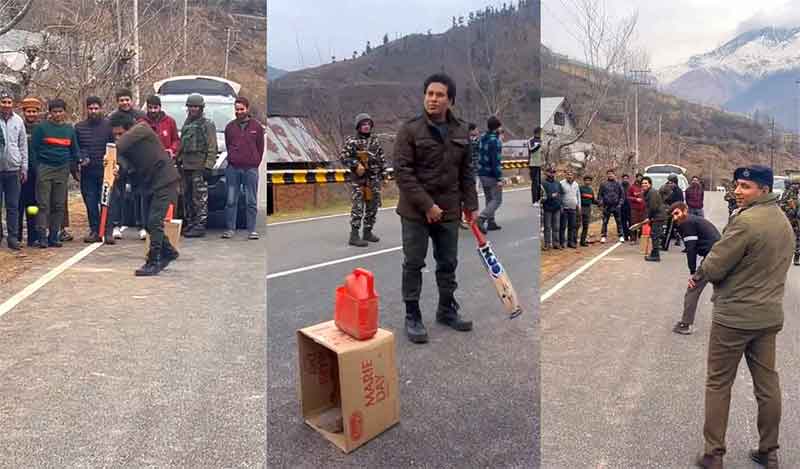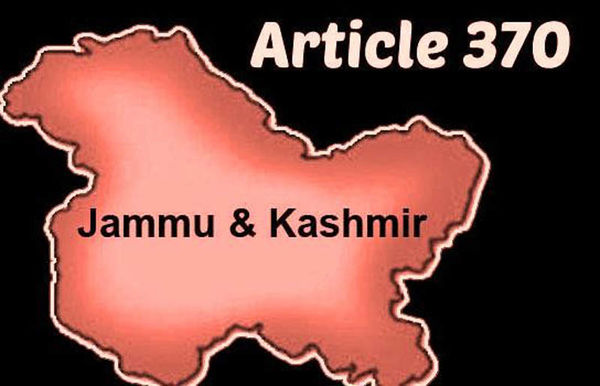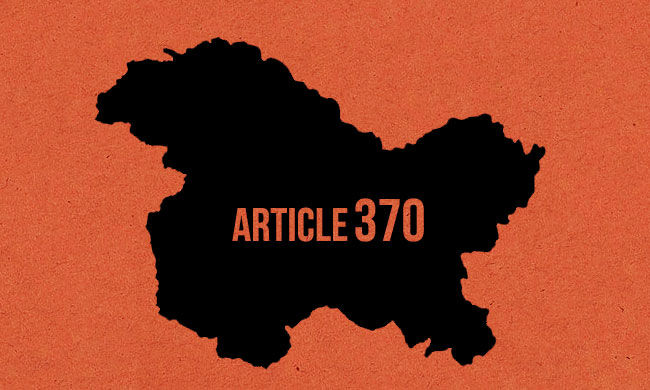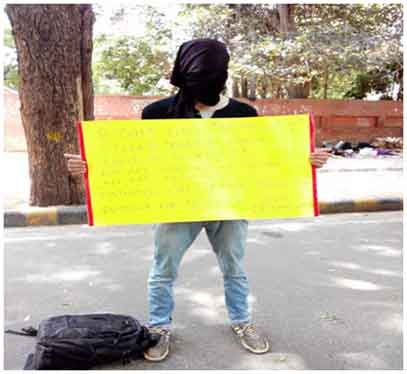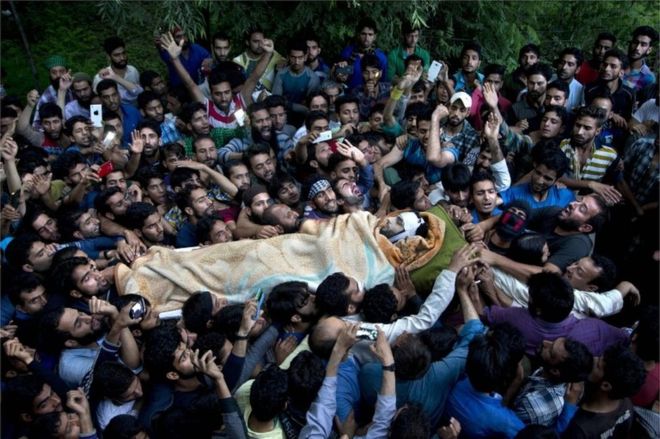
I had set off too early to catch her before the body of her slain son would reach the village.
After killing young boys, the Indian security forces would return their bodies to their parents for burial. This favour had stopped now. They bury boys anywhere they think would not attract a sea of mourners.
Her boy was killed in the ‘fake encounter’ a day before he left to reach Srinagar where he had planned to take extra classes of tuition. He wanted to achieve the level of excellence to get through the competitive examination for admission in medicine.
Her close neighbour who guided me from Srinagar to reach her house in Pulwama told me that it would be out of the question to get close to her in such a grim atmosphere where the roads and streets would be thronged by villagers, policemen, and soldiers.
Though, my guide did succeed in making a little space for me in another cart that was adjacent to hers which had her, the body of a son, that she had covered in her bosom like she was breastfeeding him.
I was witnessing this situation for the first time in my fifty years of journalistic experience that mother in Kashmir was carrying the body of her son on a cart to bury him, appealing to people to stay resolute, pray for his Magfirat, and do not let his dream of freedom die with him.
‘Was he a militant’? I asked my guide cum neighbour.
She gazed at me for a while, dabbed her eyes with the sleeves of her Pheran, and coughed before whispering in my ear, ‘we are all militants, mothers, sons, daughters, grandfathers, four generations, so is she and her son. Are you not as well? But, he had no gun or training or connection. He was taking tuition to study and get admission in medicine so that he would become the first doctor in our village. Indian soldiers created a fake encounter and declared him a terrorist. Go close to his body, see his face, he had not grown a beard yet. He was hardly nineteen years old. This is our destiny to pay for what has been snatched from us’.
I didn’t muster the courage to ask her more. My eyes fixed at mother who had a steely face, dry eyes like dead sockets.
Her one arm had kept his broken neck close to her bosom while using her other hand to touch the approaching mourners who were paying their respects by touching fallen martyr and then dabbing their face as a blessing from Allah.
I tried hard to peep into her dead sockets to get a feel of her inner turmoil.
It was rather my imagination, inside; she was writhing in pain, fear, sweat, and loss. Yet, she was struggling hard to keep her composure and calmness.
Every mourner, coming close to see the last glimpse of the martyr would chant loudly, “Hum key Chahtey Azadi” (We want freedom) that would get echoed and reverberated in thousands of lamentations. Soon, the mourners had become ecstatic with the pain of howling and chants of Azadi, Azadi.
Freedom…..
Freedom……
Looked like mountains, streams, Chinars, meadows, and fear-stricken mourners had been offered the taste of freedom and they were praising almighty for this blessing.
The deafening sounds of Azadi had just rekindled the freedom movement and turned the whole universe into one big whirling object. It was too difficult to discover were they ecstatic or were they whirling in mourning?
Many questions were hammering me, were they elated that the killing of the nineteen-year-old icon would end their occupation, or were they feeling the pain of a mother who could hardly breathe and keep her arm under the broken neck of her son?
Who could dare ask such questions in this charged atmosphere?
The guide lady had told me earlier before we reached the village that there was no whole body found at the encounter site, just a ‘bundle of few crushed bones, the broken head, and the entwined guts which were scavenged from the debris where the two-story house was blasted by some chemical grenades’.
I was trying to get close to her cart but people were pulling it towards them so to reach her for paying their condolences.
Mother had become more crushed than that the crushed bones of her son, she had now wrinkles of fatigued expression but no sight of pain or fear of hundreds of soldiers who had started surrounding the mourners. Many soldiers trying to get control over the frenzied situation they thought was overpowering them with their increasing number and passion.
One of the soldiers accompanying the local policeman came close to mother and whispered something to her. She pushed them away in disgust and anger. She became so fierce that the soldier had to leave in a hurry before he thought would be empowered by mourners approaching towards him. The policeman ran like wind without looking back.
‘Maybe she wanted to cry in anger but her eyes had become so dry that her pupils look gouging out’. My mind was busy in doing emotional calculations. ‘She had no time to think about herself. She had to bury her son before the darkness fall so that she will go home, close the door and feed her another two kids who she had left with the neighbour since yesterday. She was a sole parent living on the rental income of a shop her husband had left them after he died from a heart attack’.
This information I got from her neighbour was enough to develop a story about her which I had to submit to my editor early the next morning. I sighed with relief.
‘Hurry up, boys. We must stop people coming close now and place my boy in the grave before dark’, she asked two young boys who were holding the body of a martyr from the feet side. She was talking like she had to store the sack of rice in the shed.
‘How can we stop so many mourners who had come for the last glimpse? It will be unjust. Just a little more time and then it is over’. One of the boys holding the feet of the body in his hands said in a whisper.
She was thinking she might faint due to inhaling too many breaths and too much Covid air. ‘God, have mercy on me. Passing out wouldn’t let me reach my other two kids. God, let you become the witness to my resilience and endurance. Let you not test me anymore. Let this funeral be get done quickly’.
The boy beside her was looking at her, deep in thoughts and asking him, ‘was she muttering something or thanking almighty for being the mother of a martyr who had attracted thousands of people for his last rites. What a funeral and what dignity in death. I wish I would die such death and I had such grand burial’. He came close to her and whispered in her ear, ‘aunty, we are waiting for Imam Sahib to lead us for Namaz-i-Jinaza, just a few minutes more’.
She looked at him like she had lost all faculties of mind to understand the essence of what he was uttering in the cacophony of a huge crowd. But, she wanted to tell them to pick pace to bury him or she will lose the other two kids to her negligence. Very soon, she will be blamed for being gloating over the fact that she had achieved the status of a mother of a martyr but ignored two little kids and left them at the mercy of a neighbour.
Covered in a black Chador approached the middle-aged woman with a heart-piercing cry and pushed herself close to the cart to look at the face of the martyr.
“Ha mayni shaheedo, ba kouna gayes chani badala shaheedi, quomus aesi chani zaroorat, aes kithapaeth ladav zalim hukumranus seeth” Hey, My martyr, why wouldn’t I became a martyr in place of you. Our nation needed you. How are we going to fight against the occupation?
women, old, frail, and young, all pushing and making their way towards the cart which had mother kept her son’s body in a bosom.
she just moved her aching arm a bit. The head of the martyr got tilted further back, thus hampering mourners to get a last glimpse. The cart had enough space, which had the mother and two boys holding a body on a makeshift stretcher; she was the only one from the upper side holding his head whereas the other two boys were keeping hold of his rest of the body. On top of the body was a green flag with Quranic verses engraved on it.
For a long journey of about five miles, she was in the same position as a statue and about to collapse when she whispered to a boy beside her, ‘I will not wait for Imam Sahib; I want you to pray his namaz Jinaza’. The boy was perplexed and trying to find words to convince her to wait but he couldn’t utter a word, even a word of consolation.
‘How long I can wait until Imam Sahib comes and gives the sermon on martyrdom‘. She was thinking. She raised her voice with Quranic recitation that is usually recited by the Imam while offering Namaz-i -Jinaza. Everything stopped, the chants, mourners, pushing, and walking. Amid deathly silence, she started reciting verses and then, addressed thousands of mourners, ‘this is my son who laid his life for the end of our occupation. Who sacrificed his future for our freedom? Do not weep or cry. He achieved martyrdom. Pray almighty to accept his Shahadat but please do not forget those who he left behind’. After finishing, she placed the head of the martyr down, signalled the boys holding the cart to bury him, and jumped out of the cart.
In the core of her heart, there was an agonizing pain. She had a feeling that blood was oozing out of her ribcage. But, she didn’t let anybody get a feel of it.
She knew this emotional euphoria will die down soon. ‘There has never been a single soul to find how we were living with hunger and how we had to bear the shame of begging help from our neighbours since the death of my husband? Should I poison my two kids now or jump into the Jhelum. Why did my son have to visit such a place that had to become his death trap? Why didn’t he think he was my only hope? Why did he have to leave a big hole in my heart? Who will I talk to and show my broken heart’.
She tilted her head sideways and looked at the bruised and broken face of her son. She had no sense if she was still breathing or was her heart still beating. She tried to cry, she didn’t. She tried to shout, she couldn’t. She looked again at boys who had fear written on their faces. That even didn’t bring tears to her eyes.
She was stuck at the same spot for a few moments. She thought she has been stuck here for centuries. She must leave………she must run……….
Boys as young as fifteen and sixteen raised the body from the cart and placed him gently into the grave while reciting the Quran. Hundreds of mourners were chanting “Hum kya Chahtey, Azadi”…..
Everyone pushing hard to get got close to the grave and offer a hand in filling it up.
She left the place, the crowd, and the body without looking back.
She was running like an unbridled horse, breathing heavily, sweating profusely until she reached her house where darkness had engulfed the whole village. Close to the door, she saw her two little kids sitting quietly, making no sense of the shadows hovering around them.
They were alone, scared, and tormented. The shadow was getting bigger and bigger. in the shadow of the darkness there came a voice, shush…..soothing ……. softening….
‘Oh, my Jigar, moug lijiva baliyey’ (my sweethearts….may your mother take all your worries)
She hugged them, took their coldness, and their fear in her eyes. The warmth of her bosom, the sweating of armpits, and the aches of her body seemed the ray of light after a long night of darkness and dankness. She found a tear on her cheek, then it was drizzle and then it became torrential rain……they were drenched into a flood of tears………
The chants of Azadi were coming from distant villages.
She closed all the windows and doors.
She went into the adjacent room to the kitchen where books of her dead son were scattered, she sat down, kissed the books, smelled his shirt, and shrieked in such a pain that the mirror at the wall came crashing down and fell over her in hundreds of pieces.
‘This will ease my pain a little. The pain in the heart is unbearable as the pain caused by these glass pieces. I am a bad mother. why don’t I want to feel the pain of my son who is being buried five miles away? Why am I playing with the broken glass? I must be declared the bad mother and I must be punished with a death sentence along with my two other kids who cannot bear the death by crushing their bones or pulling their guts with chemical grenades’.
Nobody had any idea about her……..not even thousands of mourners who were still chanting at the burial site of her son.
This place has a strange custom, remembering dead and forgetting those who are left behind.
Only, the teenage girl of the same village who had stayed behind at the grave felt badly a sense of loss, the mother had gone through.
while gazing at the aching arm of the mother near the funeral site earlier, she cried and writhed in pain. She was still mourning, crying, and beating her chest. Perhaps, thinking the mother couldn’t keep her arm still and she lost sight of his disfigured face.
She had to wait behind the tree until he would be buried, until there is silence at the graveyard, until it will get dark, until the chants will fade, until the mourners shut their doors, until the dogs run towards the military bunker at the other end of the orchard, she will, then, sit near his grave and grieve without fear of being caught by somebody for shaming her family or dishonouring her village.
She will snub and ask him, ‘why did you have to leave me without even saying goodbye or why didn’t you take me with you or why did you break the promise of making me your bride or why did you prevent me from talking about Azadi’?
She didn’t make sense of the situation, ‘had he suffered more from the shrapnel of a grenade or when he was under the tons of hot debris? Has he found peace or I have to suffer all my life? who will suffer more, me or him? Can there be a measuring rod to see the level of suffering; can we measure all, me, him, or his mother like we measure the level of flood in river Jhelum?
She was sobbing silently, so was the mother whose arm had become soared as if the puss was oozing out of her armpit. But, she was the mother of martyr today, so she had to be proud in presence of thousands of mourners that tells upon the popularity of fallen Mujahid.
Earlier, politicians would gather people to show their popularity which has now changed. Politicians had to hide behind the gun of security forces whereas ordinary boys had to get a dignified burial after getting killed in fake encounters.
Change in Kashmir landscape……….
It was around midnight when this teenage girl sobbing at the grave of her fiancée, mopped her eyes with her Chador. She looked around; there was only blackness, shadows, and whispering of insects. ‘I am not afraid of shadows or ghosts. I did not get a chance to become his bride in this world but I will get a chance to meet him, in hell or heaven, I don’t care…….Hey, darkness, stay witness to my promise that I make today to follow his dream and meet him soon……
She covered herself in Chador and left the grave in silence. She followed the way leading towards the dense forests of Pir Panchaal……
The girl had disappeared in the jungle-like the nineteen-year-old boy who was buried under the tons of soil.
And, I was still waiting at the edge of the street leading to the house of a mother; there seemed only shadows of obscurity and the darkness surrounding the house. I was as blind as a bat.
(Writer is an ex editor of BBC and penguin author of ‘Lost in terror’).
IF YOU LIKED THE ARTICLE SUPPORT PEOPLE’S JOURNALISM

